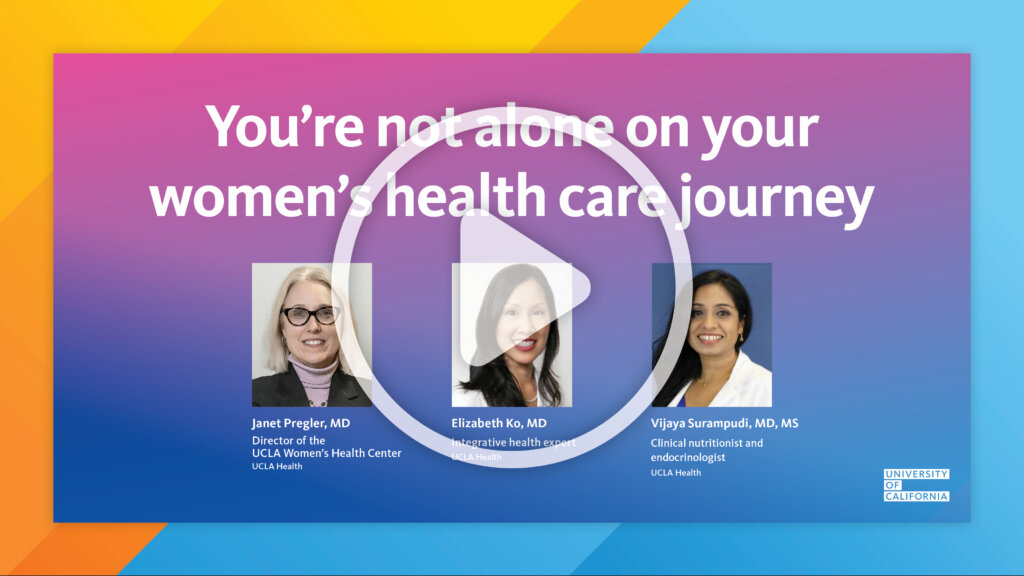A holistic approach to health for every stage of women’s lives
Share This Article

Women’s health needs evolve over time, requiring personalized care at every life stage. Get expert advice about steps you can take to maintain your well-being for life.

Watch the video: Three UC Health women’s health experts offer valuable guidance and insights for living a life of health, regardless of age or life stage. The physician experts focus on integrative (holistic) health, nutrition, and prevention and lifestyle.
Dr. Elizabeth Ko, an integrative health expert at UCLA Health, offers health guidance by suggesting that we look at life as a book, with chapters representing different life stages. “Across all stages, the four pillars of movement, nutrition, stress management, and sleep are the constant thread, the foundation to optimal health.”
Take advantage of this guidance from the experts, and learn more about resources provided by UC medical plans, to live every stage of your life to the fullest. “You are the author of your story,” says Dr. Ko. “You are the captain of your team. [Your doctor is] your coach, standing by your side—play by play.”
Laying the groundwork
Dr. Vijaya Surampudi, MD, MS, a clinical nutritionist and endocrinologist at UCLA Health, underscores the importance of developing healthy habits in early adulthood by “figuring out what works for you in your body.” A focus on mental health, sleep, nutrition and exercise has added benefits for parents, supporting their own wellbeing and the wellbeing of their families.
“For young adult women, our goal is to set women up to make sure that their health allows them to do the things that they want to do in their future,” notes Dr. Janet Pregler, MD, Director of the UCLA Women’s Health Center. “Screenings and lifestyle planning lay the groundwork for long-term wellness. Regular monitoring for high blood pressure, diabetes, and cholesterol is vital, as these conditions often go unnoticed until later in life.”
Every UC medical plan offers no-cost preventive care and screenings tailored for your age and risk for certain conditions. Refer to the contact information below or on your ID card to schedule an appointment.
Midlife and menopause
Dr. Ko notes that healthy habits remain critical during midlife and menopause. What matters most in midlife is “consistency over intensity. Infuse these habits into your life with the same regard as brushing your teeth or washing your face.”
Midlife introduces hormonal changes that affect metabolism, heart health, and bone strength. “Even women who don’t have bothersome [menopause] symptoms need to know that menopause affects their health in profound ways,” says Dr. Pregler. Cancer screenings, also covered by UC medical plans, become crucial at this stage, with rising cases of breast and colon cancer in women in their 40s.
Accessing care for symptoms of menopause can be challenging — 86% of OB-GYNs report lacking formal menopause training1 — making it more important than ever to find the right provider. Dr. Ko advises, “Be picky about your doctor. You shop around for a partner, for a dress, for a gym—why not for your doctor? The strength of that relationship is critical.”
Check with your medical plan to find providers with expertise in midlife and menopause care and treatment. UC Health, which is part of the provider network for UC’s PPO plans and the UC Blue & Gold HMO, offers women’s health and menopause resources at UC’s health centers:
- UC Berkeley Menopause Supportive Workplace
- UC Davis Menopause Resources
- UC Irvine Women’s Health Services
- UCLA Comprehensive Menopause Care
- UC San Diego Health Menopause Health
- UCSF Health Menopause Resources
Employees and families not close to a UC health center may have virtual options available for midlife issues and menopause treatment. For example, Midi Health is a virtual only provider with expertise in menopause care. UC Care, UC Health Savings Plan and CORE members have access to Midi Health providers.
Aging with strength and purpose
For older women, the focus shifts to cognitive health, mobility and independence. Dr. Pregler introduces the Five M’s as a framework for aging well:
- What Matters Most: Personal goals should guide health care decisions.
- Mind: Cognitive interventions to promote long-term memory health.
- Mobility: Maintaining physical function for long-term independence.
- Medications: Avoiding potential medication interactions.
- Multi-complexity: A holistic approach to addressing multiple health concerns that often come with aging.
Dr. Ko highlights the importance of social connection. “The Harvard Study for Adult Development shows that the quality of your relationships is directly tied to happiness, health, and longevity.” She recommends asking yourself: How can I feel connected? How can I feel healthy? How can I feel purposeful?
The UC community offers many opportunities for connection — from your local staff assembly to travel opportunities for retirees. Learn more about how to get involved as an employee and how to stay engaged as a UC retiree or emeritus.
Getting help
UC medical plans offer comprehensive women’s health resources, including no-cost preventive care tailored for your age and risk for certain conditions:
Findhelp, the largest network of free or reduced-cost social assistance programs and resources in the United States, is available to all members of the UC community. For resources in your area, go to findhelp.com, enter your ZIP code and search for “women’s health.”
